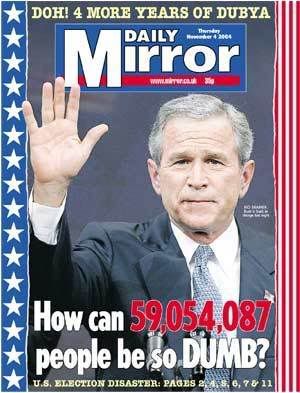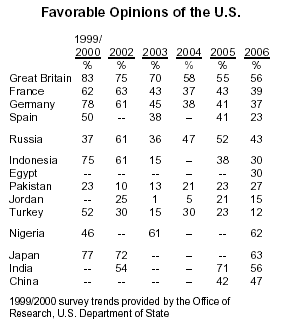I have lived in China since August 2003 and one thing that has always amazed me has been the global reach of American politics. For sure, criticism of American foreign policy in the Middle East is to be expected, and I have often found myself in heated debates over the War in Iraq.
SNIP
These days, whenever I find myself in a discussion about American politics, it usually involves the 2008 election. The interest is stunning. Just months into the election of 2008, in April 2007, I found myself in an intense Obama v. Clinton debate (guess which side I took) with an Austrian acquaintance over dinner. We talked about hope, change, experience, symbolism, the war in Iraq.
Why have attitudes toward America changed so much? The invasion of Iraq and the arrogant, condescending attitude of our nation's leader. On the second anniversary of September 11th, the New York Times reported that the war had cause support for the United States to deteriorate:
In the two years since Sept. 11, 2001, the view of the United States as a victim of terrorism that deserved the world's sympathy and support has given way to a widespread vision of America as an imperial power that has defied world opinion through unjustified and unilateral use of military force.
''A lot of people had sympathy for Americans around the time of 9/11, but that's changed,'' said Cathy Hearn, 31, a flight attendant from South Africa, expressing a view commonly heard in many countries. ''They act like the big guy riding roughshod over everyone else.''
In interviews by Times correspondents from Africa to Europe to Southeast Asia, one point emerged clearly: The war in Iraq has had a major impact on public opinion, which has moved generally from post-9/11 sympathy to post-Iraq antipathy, or at least to disappointment over what is seen as the sole superpower's inclination to act pre-emptively, without either persuasive reasons or United Nations approval.
Who cares? No matter who is president, things will change and the world will be pleased, right?
Not exactly. For all his talk about how he was right about the surge and how he stood up to the president and his own party, there is no daylight between George Bush and John Mcain on Iraq. When Iraqi leaders came out in support of Obama's Iraq policy, John McCain, channeling George Bush's arrogance, rejected Iraqi Prime Minister Nuri al-Maliki's statement that the US needed to set a timetable for leaving Iraq. Electing John McCain means four more years of the Bush Iraq policy: more war and more false attacks on his political opponents.The United States of America--and the world--cannot afford four more years of Republican rule. On Tuesday, August 26, Hillary Clinton is going to address to the Democratic National Convention. She is going to reiterate her support for Senator Obama and she is going to call on all of her supporters to join her in helping him get elected. That certainly is not the speech that Hillary wanted to give, and it's not the speech this blogger wanted to watch.
But the reality is that Obama is the nominee and we only have two choices in this election--war or peace. Hillary chooses peace. I choose peace. What about you?













6 comments:
Nicely said, Drew. I choose peace as well. I just hope at least 50% of all the other Americans feel the same way we do.
I don't know what I'll do if McBush is elected this fall. I mean it! I'm so afraid of what he'll do to keep the perpetual war machine going. I just fear this long 8 year Bush-Cheney nightmare will become complete sorrow, horror, and (yes) terror for this nation if McBush & jis Rethuglican Party are given four more years of rule.
britain is the greatest ally? pshaw. great post drew - the world is watching...
I said Britain was America's closest ally. America's coolest ally is north of the border.
Outstanding Article, Drew! An insightful look at how Bush has damaged our "street cred" with the rest of the world. Very Masterfully Done!
Dizzy
Great article. Our reputation around the world really suffered when we re-elected Bush, and electing McCain would do even more damage. Just another reminder of how important this election is.
Sadly, there are many Americans (I am related to a bunch of them) who are oddly proud that "furnurs" dislike the US. They think it is some kind of badge of honor that we stand alone much of the time. They see any attempt to placate other nations as making ourselves weak. Isolationism is alive and well here, because the folks who believe in it are uneducated about why being part of the global community is necessary for our survival. They are blissful in their ignorance, however, so I don't know if they will even listen to arguements about changing our world image.
Post a Comment